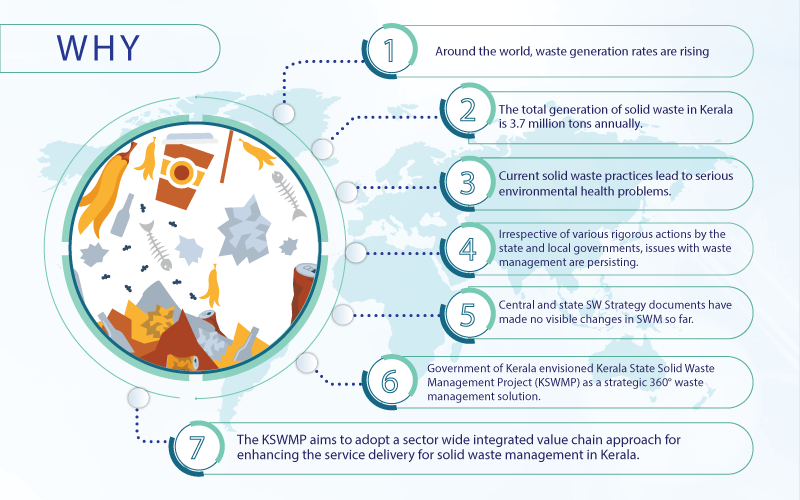
Kerala has 6 Municipal Corporations, 87 municipalities, 77 Taluks, 14 District Panchayats, 152 Block Panchayats and 941 Grama Panchayats. The total generation of solid waste in Kerala is 3.7 million tons annually. The total share of biodegradable and non-biodegradable waste is at 69% and 31 % respectively. The biodegradable waste has a moisture content of about 70%. Combustible and non-combustible fraction of waste in non-biodegradable category is at 79.2% and 20.8% respectively.
The solid waste generated in the state on a daily basis is usually disposed of or incinerated. These practices are leading our land to serious environmental health problems. Currently, the waste management system in the state focuses on the citizen responsibility of managing biodegradable waste at source under ‘My waste, My responsibility’ approach with a focus of instilling a sense of ownership and duty among citizens. The local government’s involvement in handling of waste is restricted mostly to collection and recycling of non-biodegradable waste and collection of biodegradable waste from bulk generators.
The issues with respect to solid waste management are still persisting irrespective of various rigorous actions by the state and local governments. Even though Kerala enjoys the prestigious brand name ‘God’s Own country’ due to its boundless natural beauty, accumulation of waste at tourist spots, roads, public places with waste litters, polluted water bodies, stagnant contaminants, eutrophication of lakes and water ways etc. has seriously affected the aesthetic appearance and hygienic environment.
Though many strategy documents for solid waste management namely The Solid Waste Management Rules, 2016; The Construction & Demolition Waste Management Rules, 2016; Kerala State Policy on Solid Waste Management, 2018 are in account, there has been no visible changes in the treatment and management of solid waste in the state till now. The Kerala State Waste Management Policy, 2018 envisages a healthy, prosperous and resource-efficient society in which waste are reduces, recycled and prevented whenever feasible and beneficial and disposed off in an environmentally safe manner. The Solid Waste Management Rules 2016 and subsequent National Green Tribunal rulings have made Municipal Solid Waste management an urgent environmental issue.
The Central Government has revamped the Municipal Solid Wastes (Management and Handling) Rules 2000 and notified the new Solid Waste Management Rules, 2016 on April 8, 2016. The document proposes scientific disposal of solid waste through segregation, collection and treatment and disposal in an environmentally sound manner minimizes the adverse impact on the environment. As per the Integrated Solid Waste Management Strategy document 2020, one of the primary responsibilities of local self-governments with regard to civic services is the management of solid waste. The Solid Waste Management Rules 2016 lays out a blue print of the activities and practices to be followed by local governments in this regard.
Though the state appears to have achieved some efficiency in waste segregation at source and in bringing a striking behavioral change and sense of responsibility among citizens regarding the need and methods of efficient and effective segregation, it still faces major challenges and issues in the existing waste management practices. Some of the major concerns are listed below:
- Restrictive policy which promotes source treatment for household biodegradable waste;
- Low adoption of good quality source treatment;
- Limited collection of waste
- Unstructured contracting terms for private engagement;
- Inadequate audit and monitoring of waste management practices;
- Inadequate processing and disposal of waste;
- Off take of shredded plastic is minimal
- Large quantities of the collected NBDW is either dumped in poorly maintained dump sites or are accumulating at the existing Resource Recovery Facility (RRF)/Material Collection Facilities (MCFs), which are not designed or equipped to handle the load efficiently;
- BDW collection and treatment is infrequent at most ULBs;
- For ULBs that collect and treat BDW, low off take of finished compost (poor quality or inconsistent quality/ demand) and accumulation of compost at treatment plants is an issue;
- The state notably lacks disposal sites complying to environmental regulations, with adequate leachate treatment/ gas collection facilities.
Several isolated waste management experiments has been done in Kerala successfully. There is a need to further consolidate these projects for a linear approach to find a solution to the solid waste management and treatment. The Kerala Solid Waste Management Project (KSWMP), a project conceived by the Government of Kerala with the financial assistance of the World Bank and the Asian Infrastructure Investment Bank (AIIB), aims to strengthen urban waste management services in Kerala and to equip them with modern scientific and technological systems. The Kerala State Solid Waste Management Project aims to adopt a sector wide integrated value chain approach for enhancing the service delivery for solid waste management in Kerala.
